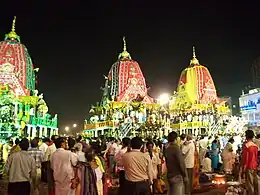Grishma
Grishma (Sanskrit: ग्रीष्म, romanized: Grīṣhma) the Sanskrit word meaning summer.[1] This is one of the six seasons (ritu), each lasting two months, the others being: Vasanta (spring), Varsha (monsoon), Sharada (autumn), Hemanta (pre-winter), and Shishira (winter).[2]

The Ratha Yatra festival is marked during the season of Grishma
It falls in the two months of Jyeshtha and Ashadha of the Hindu calendar, or April and May of the Gregorian calendar.[3] It is preceded by Vasanta, the spring season, and followed by Varsha, the rainy season.
References
- Barnett, Lionel D. (1999-04-30). Antiquities of India: An Account of the History and Culture of Ancient Hindustan. Atlantic Publishers & Dist. p. 189. ISBN 978-81-7156-442-2.
- Klostermaier, Klaus K. (2010-03-10). A Survey of Hinduism: Third Edition. State University of New York Press. p. 492. ISBN 978-0-7914-8011-3.
- Walker, Benjamin (2019-04-09). Hindu World: An Encyclopedic Survey of Hinduism. In Two Volumes. Volume I A-L. Routledge. p. 230. ISBN 978-0-429-62421-6.
Sources
- Selby, Martha Ann (translator). The Circle of Six Seasons, Penguin, New Delhi, 2003, ISBN 0-14-100772-9
- Raghavan, V. Ṛtu in Sanskrit literature, Shri Lal Bahadur Shastri Kendriya Sanskrit Vidyapeetha, Delhi, 1972.
This article is issued from Wikipedia. The text is licensed under Creative Commons - Attribution - Sharealike. Additional terms may apply for the media files.